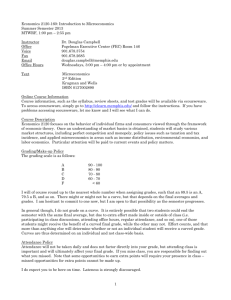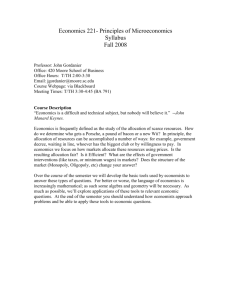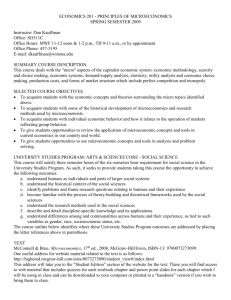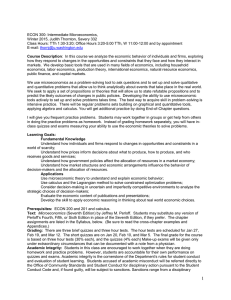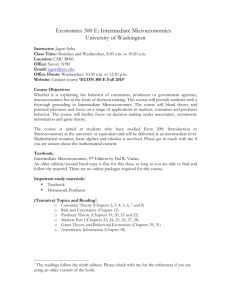DRAFT………. DRAFT………. DRAFT………. DRAFT………. DRAFT………. DRAFT……….DRAFT HARVARD UNIVERSITY Department of Economics
advertisement
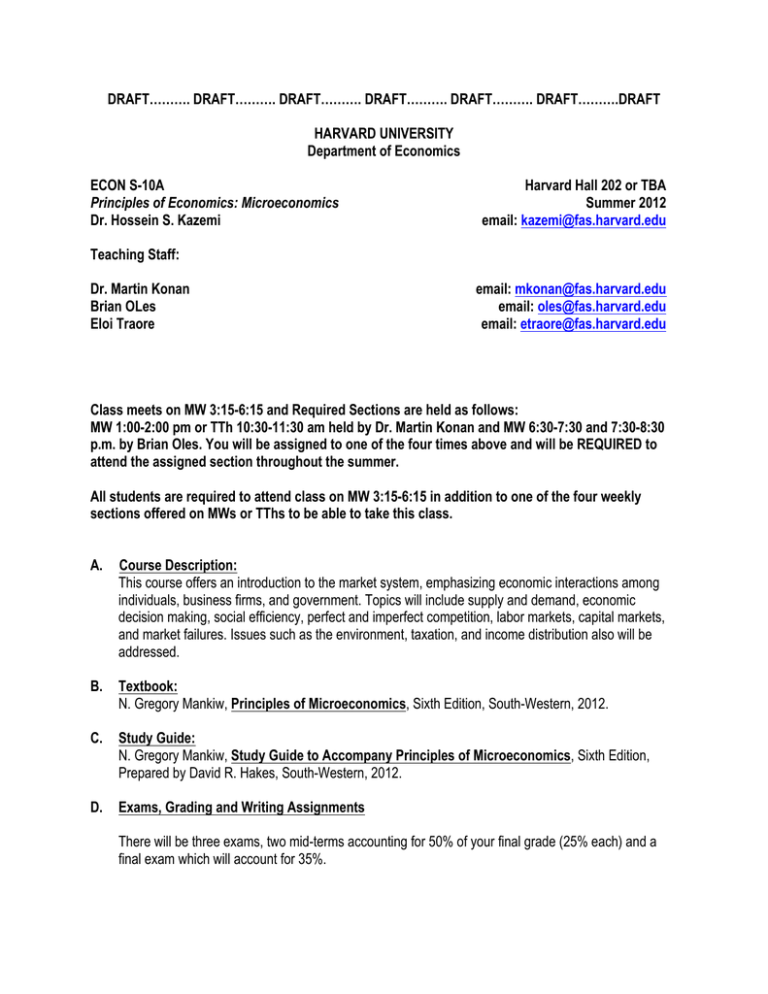
DRAFT………. DRAFT………. DRAFT………. DRAFT………. DRAFT………. DRAFT……….DRAFT HARVARD UNIVERSITY Department of Economics ECON S-10A Principles of Economics: Microeconomics Dr. Hossein S. Kazemi Harvard Hall 202 or TBA Summer 2012 email: kazemi@fas.harvard.edu Teaching Staff: Dr. Martin Konan Brian OLes Eloi Traore email: mkonan@fas.harvard.edu email: oles@fas.harvard.edu email: etraore@fas.harvard.edu Class meets on MW 3:15-6:15 and Required Sections are held as follows: MW 1:00-2:00 pm or TTh 10:30-11:30 am held by Dr. Martin Konan and MW 6:30-7:30 and 7:30-8:30 p.m. by Brian Oles. You will be assigned to one of the four times above and will be REQUIRED to attend the assigned section throughout the summer. All students are required to attend class on MW 3:15-6:15 in addition to one of the four weekly sections offered on MWs or TThs to be able to take this class. A. Course Description: This course offers an introduction to the market system, emphasizing economic interactions among individuals, business firms, and government. Topics will include supply and demand, economic decision making, social efficiency, perfect and imperfect competition, labor markets, capital markets, and market failures. Issues such as the environment, taxation, and income distribution also will be addressed. B. Textbook: N. Gregory Mankiw, Principles of Microeconomics, Sixth Edition, South-Western, 2012. C. Study Guide: N. Gregory Mankiw, Study Guide to Accompany Principles of Microeconomics, Sixth Edition, Prepared by David R. Hakes, South-Western, 2012. D. Exams, Grading and Writing Assignments There will be three exams, two mid-terms accounting for 50% of your final grade (25% each) and a final exam which will account for 35%. During the semester, there will be several writing assignments. The assignments are weighted as 15% of your total grade. Assignments are due in the following class automatically, unless I mention otherwise. Missing class does not waive or extend the deadline for submitting an assignment. The following dates have been selected for the two midterms and the final: 1st Exam: Monday July 9th at 3:15 pm. 2nd Exam: Monday July 23rd at 3:15 pm. Final Exam: Wednesday August 8th at 3:15 pm. Early or Late Exams WILL NOT be given. If your schedule does not permit being there for every exam as scheduled above, you should plan on taking a different course. “Make-up” exams will not be given for missed scheduled exams except in the case of a reasonable and valid excuse which is submitted to me promptly. These excuses are subject to my approval, and I may require further substantiation. For approved excuses, a make-up exam will be scheduled for the same day as the final exam. Since authorized make-up exams are only given on the day of the final (August 8nth,) if a student is not on campus on that day and therefore missed the chance to make up an exam, regardless of the reason, will receive a grade of zero for the missed exam. Therefore, students who do not anticipate being on campus during the entire summer should recognize that they will NOT have a chance to make up a test. E. Reading Schedule I. Principles of Economics a. Definitions b. Microeconomics vs. Macroeconomics c. Objectives d. Production Possibilities Frontier Reading Assignment: Chapters 1 through 3 II. Supply and Demand: How Markets Work a. Demand b. Supply c. Demand and Elasticity d. Supply and Marginal Cost e. Supply Elasticity Reading Assignment: Chapters 4 and 5 III. Supply, Demand and Government Policies a. Price Ceilings b. Price Floors c. Tax Incidence d. Elasticity and Tax Incidence Reading Assignment: Chapter 6 IV. Consumers, Producers and Market Efficiency a. Consumer Surplus b. Producer Surplus c. Market Efficiency d. Market Failure Reading Assignment: Chapter 7 V. The Costs of Taxation a. Deadweight Loss of Taxation b. Determinants of Deadweight Loss c. Supply-Side Economics d. Laffer Curve Reading Assignment: Chapter 8 VI. The Theory of Consumer Choice a. utility maximization b. substitution effect c. income effect d. indifference curves Reading Assignment: Chapter 21 VII. International Trade a. Determinants of Trade b. Winners and Losers from Trade c. Gains of Trade d. Effects of Tariffs and Quotas e. Arguments against Trade Reading Assignment: Chapter 9 VIII. The Economics of Public Sector a. Externalities and Market efficiency b. Private and public Solutions to externalities c. Public Goods d. Common Resources e. Taxes and Efficiency f. Taxes and Equity Reading Assignment: Chapters10, 11 and 12 IX. Analysis of Cost a. different types of cost b. short run vs. long run c. marginal cost d. economies of scale e. cost/benefit analysis Reading Assignment: Chapter 13 X. The Theory of Firm and Market Structure a. perfect competition b. profit maximizing c. supply curve in a competitive market c. pure monopoly d. welfare cost of monopoly e. price discrimination f. oligopoly g. Game Theory and the Economics of Oligopoly h. Public Policy toward Oligopoly i. monopolistic competition j. advertising Reading Assignment: Chapters 14,15,16 and 17 XI. Factors Market and Income Distribution a. labor market b. wages and salaries c. human capital theory d. income distribution e. poverty Reading Assignment: Chapters 18, 19 and 20
